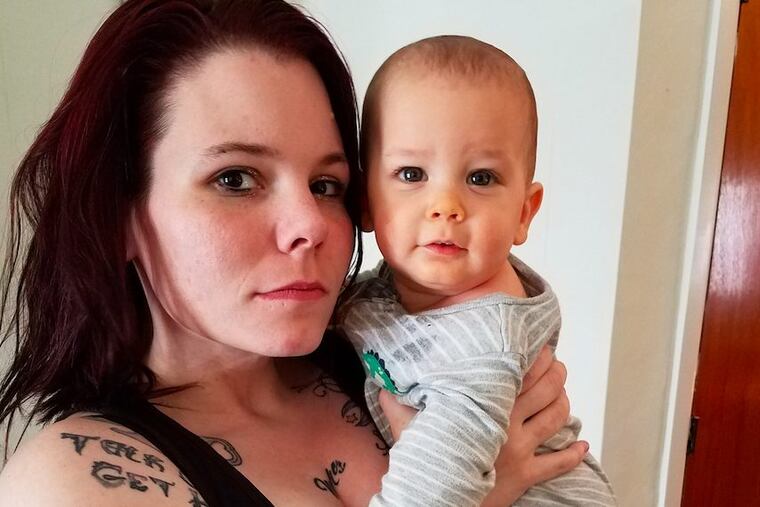'I felt like a caged animal.' Pa. woman claims jail illegally shackled her during labor
Though Athena Remlinger pleaded with correctional, and then medical, officials to let her carry her baby to term, they took her to Hershey Medical Center, shackled her to a rocking chair and gave her Pitocin, a drug that induces labor, she said in a federal lawsuit.

Though Remlinger pleaded with correctional, and then medical, officials to let her carry her baby to term, they took her to Hershey Medical Center, shackled her to a rocking chair, and gave her Pitocin, a drug that induces labor, she claims in a federal lawsuit filed Wednesday in U.S. District Court for Pennsylvania's Middle District.
"I felt like I was a caged animal," Remlinger, 29, of Palmyra, Pa., said in an interview. "I had no family with me, my husband didn't even know I was being induced. I had two guards with me, and I knew damn well they didn't care. I was alone."
Shackling women before, during, or after childbirth has been prohibited since 2010 by Pennsylvania law, according to the claim, filed by Angus Love of the Pennsylvania Institutional Law Project.
Love recalled holding a news conference to celebrate the passage of that bill.
"That was eight years ago," he said. "Apparently Lebanon County didn't get the message."
Lebanon County Warden Robert Karnes said he couldn't comment on the case because of the litigation, but added, "Her statements of fact are not accurate."
"We don't shackle pregnant females," he said. "We put the policy out in 2010 when the legislation came out." He also said the jail does not make decisions about induction — that would be up to medical professionals. Karnes added that, when possible, he tries to arrange medical furloughs for pregnant women.
Despite the law, there have been reports that pregnant women continue to be shackled in jails around the state. In response, State Reps. Mary Jo Daley and Thomas Murt have introduced legislation to study how the law has been implemented.
Daley, a Montgomery County Democrat, said many jails have not been reporting on their use of shackling, but that her resolution to study the issue had not advanced in nearly a year. "Is it because people actually don't think this is happening? I don't know. But this case would give me a good reason to go to them and say, 'This is an issue,'" she said. "It's a human rights issue."
Remlinger's case came to light due to the advocacy of Carolyn Robinson, an official visitor with the Pennsylvania Prison Society. "I was very concerned," she said, "because from what I understand, this is not even legal."
The lawsuit also alleges the jail violated the Eighth Amendment by subjecting Remlinger to cruel and unusual conditions. That includes shackling her throughout labor and for five days while she was in the hospital after delivery.
Remlinger learned she was pregnant while she was incarcerated on charges that she joined her husband in robbing a man in his home, searching his pockets, and hitting him in the head.
"I was pretty nervous," she said. She'd been using heroin, and was detoxing in jail on $260,000 bail. She knew it wouldn't be an easy pregnancy.
>> READ MORE: Love in the time of opioids: Adoption connects drug-exposed kids with new families
To make matters worse, she spent much of it in solitary confinement. She was put in segregated housing for her first 30 days. Later, she'd spend a month and a half in medical isolation, which she described as a small cell with a metal door where she stayed 23 hours a day.
"You only get to shower and use the phone, and then you go back into your cell," she said. "You have more freedom in the hole."
Both the Department of Justice and the American Correctional Association say pregnant women should not be held in long-term solitary. In November, Allegheny County agreed to stop holding pregnant women in solitary as part of a settlement with the five women who'd been subjected to the practice and were represented by the ACLU and other legal advocates.
Remlinger's was a high-risk pregnancy for other reasons: She was on methadone, and had other health issues.
By inducing her pregnancy early, she said, "I felt like they were putting my child at risk."
Her fears were warranted: After hours in labor, her doctor decided to break her water, and demanded the guard finally unshackle her leg from the rail of the hospital bed. When he did, he discovered she was hemorrhaging, and had to perform an emergency C-section. Her son was initially unresponsive, but was revived. "He was pretty much drowning in my blood," Remlinger said.
When she woke from surgery, her leg was shackled to the bed once again. As her ankle swelled, medical staff advised guards to remove the restraint; some guards did so, but other shifts didn't.
Today, she's home and recovering. Her son, Xavier, is 7 months old and, given everything that happened, she said, they're both doing fine.